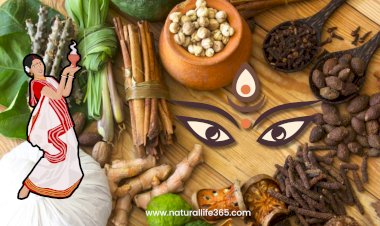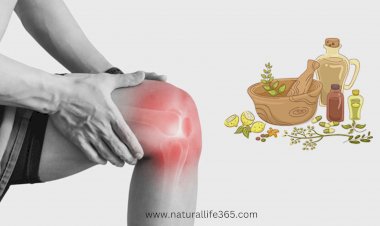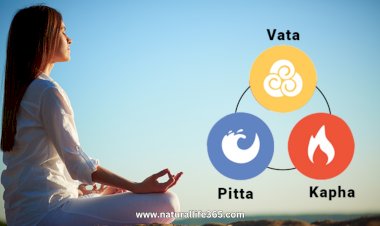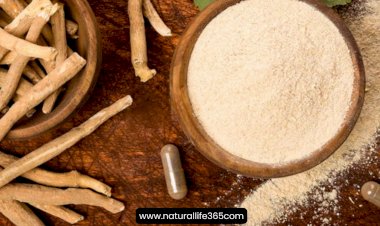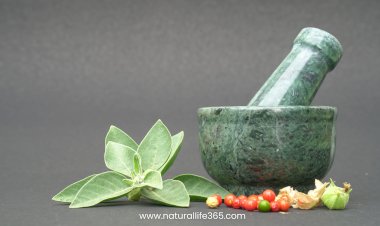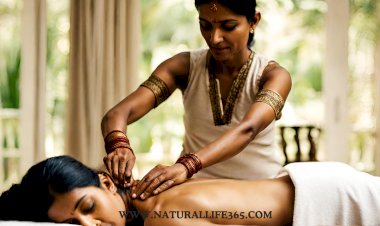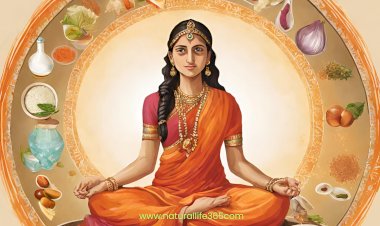What Oils are Typically Used in Abhyanga Massage, and What are Their Benefits?
Dive into the world of Abhyanga massage oils – from calming coconut to nourishing almond. Uncover the secrets behind each oil and transform your self-care routine!

In the ancient tapestry of Ayurveda, the practice of Abhyanga massage stands as a revered thread, weaving together the physical and spiritual realms of well-being. At the heart of this therapeutic ritual lies a carefully curated selection of oils, each with its unique tale of botanical prowess and holistic significance.
Join me as we navigate this aromatic labyrinth, exploring what oils are used in Abhyanga Massage, their nuanced benefits for the skin, muscles, and emotions, and how they synergistically contribute to the profound healing experience that is Abhyanga massage. Let the journey begin, where the ancient whispers of Ayurveda meet the modern seeker in a dance of rejuvenation and self-discovery.
Sesame Oil: The Foundation of Abhyanga
Sesame oil is the foundational elixir in Abhyanga massage, its roots deeply entwined with the ancient traditions of Ayurveda. Cherished for centuries, this golden-hued oil is not merely a carrier but a carrier of stories, healing energies, and transformative properties that make it an essential component of the Abhyanga ritual.
Origins and Traditional Use
Sesame Oil's journey in Ayurveda traces back to ancient India, where it found its place as a revered medicinal and culinary staple. Known as "Tila Taila" in Sanskrit, its application in Abhyanga is deeply rooted in its ability to pacify Vata dosha, offering grounding and nourishment. Sesame Oil's warm nature aligns harmoniously with the Ayurvedic principle of balancing energies, making it a preferred choice for massage that seeks to restore equilibrium.
Skin Benefits
Beyond its historical significance, Sesame Oil boasts a plethora of skin-nourishing benefits. Rich in antioxidants, it becomes a protective shield against environmental stressors, promoting skin elasticity and radiance. Its natural antibacterial properties offer a defense against microbial invaders, making it an ally for skin health. The benefits of sesame oil for skin during Abhyanga, it not only moisturizes deeply but also enhances the natural glow, leaving a feeling of rejuvenation that transcends the physical.
Ayurvedic Properties
Sesame oil is revered for its Ayurvedic properties, including its ability to pacify Vata dosha, making it especially beneficial for individuals prone to dryness, coldness, or restlessness. The oil's warming quality penetrates deep into the tissues, easing muscle tension and promoting relaxation. This makes it an ideal choice for those seeking not only physical nourishment but also a grounding and calming influence on the mind.
Coconut Oil: Cooling Bliss for Body and Mind
In the symphony of oils that grace the canvas of Abhyanga, Coconut Oil emerges as a soothing melody, offering a refreshing interlude in the rhythmic dance of self-care. Renowned for its versatility and tropical charm, Coconut Oil brings a unique set of qualities that make it a beloved choice in the ancient practice of Abhyanga massage.
Role in Abhyanga Massage
The Coconut oil in Abhyanga massage, with its cool and light texture, plays a distinctive role in Abhyanga, contributing a sense of refreshing bliss to the overall experience. Its natural composition aligns seamlessly with the aim of this Ayurvedic massage—to balance the energies within the body. As it glides smoothly over the skin, Coconut Oil provides a gentle, calming touch, making it particularly beneficial for individuals looking to pacify excess heat or Pitta dosha.
Skin Benefits, Especially for Cooling
One of the standout skin benefits of coconut oil is its remarkable ability to cool and hydrate the skin. Its inherent moisturizing properties make it an effective solution for soothing irritated or sun-exposed skin. As a hydrating agent, it penetrates deep into the skin layers, leaving it soft and supple. Beyond its physical benefits, the tropical aroma of Coconut Oil adds a sensory dimension to the Abhyanga experience, transporting the mind to tranquil shores.
Incorporating Coconut Oil into Your Routine
Whether you seek relief from the scorching heat or simply crave a touch of tropical indulgence, incorporating the cooling properties of coconut oil into your Abhyanga routine is a delightful choice. Its versatility extends beyond the massage table—use it as a pre-bath oil for a nourishing soak or let it double as a natural hair conditioner for a comprehensive head-to-toe tropical retreat.
Jojoba Oil: Nourishment for the Skin and Soul
Jojoba oil in Abhyanga massage emerges as a versatile elixir, offering a unique blend of nourishment for both the physical body and the soul. Known for its enriching properties and gentle touch, Jojoba Oil takes center stage in the symphony of oils, bringing with it a wealth of benefits that resonate deeply with those seeking a harmonious balance.
Properties and Characteristics
Derived from the seeds of the Jojoba plant native to the arid landscapes of the Americas, Jojoba Oil is a liquid wax with a composition remarkably similar to the skin's natural sebum. This unique characteristic makes it an ideal choice for Abhyanga, as it effortlessly mimics the skin's own oils, ensuring easy absorption and compatibility with all skin types. Its non-greasy texture and hypoallergenic nature make it a soothing balm for the skin.
Moisturizing Benefits for the Skin
At the heart of Jojoba Oil's allure lies its profound moisturizing effects. Packed with essential fatty acids, antioxidants, and Vitamin E, this oil penetrates deep into the skin, providing a surge of hydration that leaves the skin feeling plump and revitalized. Whether your skin craves relief from dryness or a natural glow, the moisturizing benefits of jojoba oil prowess make it a go-to companion for those seeking a radiant complexion.
Suitable Applications in Abhyanga
In the context of Abhyanga massage, Jojoba Oil shines as a versatile and nourishing option. Its lightweight consistency allows for smooth gliding during the massage, promoting a seamless and enjoyable experience of jojoba oil for sensitive skin. Beyond its physical benefits, the gentle aroma of Jojoba Oil can elevate the sensory aspect of the massage, fostering a serene atmosphere that aligns with the soul-soothing intentions of Abhyanga.
Almond Oil: A Soothing Elixir for Muscles and More
In the enchanting repertoire of oils gracing the world of Abhyanga, Almond Oil emerges as a soothing symphony, with its gentle melody resonating through the layers of skin and muscle. Known for its nourishing properties and versatility, Almond Oil takes center stage in the Abhyanga ritual, offering a harmonious blend of relief and rejuvenation.
Muscular Relaxation Properties
The allure of almond oil in Abhyanga massage lies in its ability to be a comforting balm for tired and tense muscles. Its emollient nature seeps into the skin, promoting relaxation and alleviating muscle stiffness. Whether you're recovering from a strenuous workout or seeking solace from the strains of daily life, the soothing touch of Almond Oil becomes a comforting embrace for fatigued muscles.
Nourishing Benefits for the Skin
Beyond its prowess in muscle care, the nourishing properties of almond oil unfold a tapestry of benefits for the skin. Rich in vitamins A and E, as well as fatty acids, it becomes a deeply nourishing elixir that moisturizes and revitalizes the skin. Its lightweight consistency ensures quick absorption, leaving the skin supple, hydrated, and with a radiant glow. This makes Almond Oil a versatile choice for those looking to enhance the overall health and appearance of their skin through the ritual of Abhyanga.
Use in Abhyanga for a Holistic Experience
In the context of Abhyanga, you can use almond oil for muscle relaxation, enhancing the overall experience with its therapeutic properties. Its mild and nutty aroma adds a delightful sensory dimension, creating a tranquil ambiance that aligns with the holistic intentions of Abhyanga. Whether applied with gentle strokes or targeted towards specific areas of tension, Almond Oil invites individuals into a realm of tranquility and self-care.
Olive Oil: Antioxidant Richness for Joint Health
In the mosaic of oils enriching the Abhyanga tradition, Olive Oil emerges as a distinguished masterpiece, celebrated for its antioxidant richness and profound impact on joint health. With roots tracing back to ancient civilizations, Olive Oil takes center stage in the realm of Ayurvedic massage, offering a holistic approach to wellness that extends beyond the surface.
Abhyanga Applications
The Olive oil in Abhyanga massage seamlessly integrates into the therapeutic dance of Abhyanga. Its robust and fruity aroma infuses the massage experience with a sensory richness, creating a tranquil atmosphere that aligns with the practice's intention of holistic rejuvenation. As it is skillfully applied, Olive Oil's moisturizing properties and smooth texture enhance the gliding sensation, making it an ideal choice for those seeking a comprehensive and soothing massage experience.
Antioxidant Benefits of Olive Oil for Skin
At the heart of Olive Oil's allure lies its potent antioxidant profile. Rich in polyphenols and vitamins E and K, this golden elixir becomes a shield against oxidative stress, a factor contributing to premature aging. When incorporated into Abhyanga, Olive Oil nourishes the skin at a deep level, working to combat free radicals and promote skin elasticity. The result is a radiant complexion that reflects not only external beauty but also the internal harmony fostered by the holistic practice of Abhyanga.
Promoting Joint Health
Beyond its aesthetic contributions, Olive Oil unveils a powerful role in promoting joint health. The anti-inflammatory properties of Olive Oil can provide relief for individuals dealing with conditions like arthritis. As the oil is delicately massaged into the joints during Abhyanga, it aids in soothing discomfort and enhancing flexibility. The lubricating effect of Olive oil for joint health becomes a testament to its ability to support overall joint well-being, aligning perfectly with the therapeutic objectives of Abhyanga.
Ghee (Clarified Butter): Dosha-Balancing Elixir
In the vibrant palette of oils gracing the canvas of Abhyanga, Ghee emerges as a golden elixir, weaving a tale of ancient wisdom and dosha-balancing magic. Revered in Ayurveda for its multifaceted benefits, Ghee in Abhyanga massage offers a journey into holistic well-being that transcends the ordinary.
Ayurvedic Benefits of Ghee
Known as "ghrita" in Sanskrit, Ghee holds a sacred status in Ayurveda, with its origins rooted in the Vedic tradition. Beyond being a culinary delight, Ghee is revered for its dosha-balancing properties, making it an invaluable ally in the quest for harmony within the body and mind. The unique process of clarifying butter to create Ghee removes impurities, leaving behind a pure and potent substance that aligns seamlessly with Ayurvedic principles.
Benefits for Dosha Balance
In the context of Abhyanga, professionals use Ghee for balancing doshas in harmonizing the three doshas—Vata, Pitta, and Kapha. Its inherent qualities make it a versatile elixir that adapts to the specific needs of an individual's constitution. For Vata types, Ghee's grounding and nourishing properties bring stability. Pitta individuals find relief in its cooling nature, while Kapha types benefit from Ghee's ability to invigorate and stimulate. The personalized approach of Ghee in Abhyanga underscores the essence of Ayurveda, recognizing and addressing individual imbalances.
How to Incorporate Ghee into Abhyanga?
Ghee seamlessly integrates into the Abhyanga experience, adding a layer of richness and intention to the massage. Warm Ghee becomes a velvety medium, enhancing the tactile sensations and promoting a sense of comfort. Its aroma, reminiscent of a subtle buttery embrace, creates a serene ambiance that aligns with the meditative aspects of Abhyanga. Whether used alone or as part of a herbal oil blend, Ghee invites individuals to embark on a dosha-balancing journey, where the ritual of self-massage becomes a sacred act of self-love and rejuvenation.
Bhringraj Oil: A Herbal Marvel for Hair and Scalp
In the lush garden of Ayurvedic oils, Bhringraj Oil stands as a botanical marvel, its essence deeply entwined with the secrets of hair and scalp care. Celebrated for centuries in Ayurveda, Bhringraj oil in Abhyanga massage takes the spotlight in the realm of offering a herbal elixir that nurtures not just the strands, but the very roots of our well-being.
Bhringraj Ayurvedic Benefits
Bhringraj, known scientifically as Eclipta alba, has earned its title as the "king of herbs for hair" in Ayurveda. Revered for its potent rejuvenating properties, Bhringraj is believed to pacify Pitta dosha and stimulate hair growth. Its Ayurvedic significance lies in its ability to cool the scalp, reduce excess heat that may contribute to hair issues, and foster an environment conducive to healthy hair.
Ayurvedic Herb Benefits for Hair and Scalp
As Bhringraj Oil gracefully infiltrates the scalp during an Abhyanga session, its herbal alchemy goes beyond mere aesthetics. The oil nourishes the hair follicles, providing the essential nutrients needed for optimal hair health. Regular use is believed to strengthen the hair shaft, prevent premature graying, and address common scalp issues. Naturally, the Bhringraj oil for promoting hair growth provides a balanced scalp environment making it a holistic choice for those seeking not just cosmetic improvements, but a deeper, rooted wellness for their hair and scalp.
Integration into Abhyanga for a Holistic Approach
In the context of Abhyanga, Bhringraj Oil seamlessly integrates into the ritual, transforming the massage into a nurturing experience for the hair and scalp. The herbal infusion creates a sensory delight, and as the oil is massaged into the scalp, it encourages relaxation and promotes a sense of well-being. The holistic approach of Bhringraj aligns perfectly with the principles of Abhyanga, where the interconnectedness of mind, body, and hair is acknowledged and embraced.
Neem Oil: Detoxification and Skin Healing
In the vast realm of Ayurvedic oils, neem oil in Abhyanga massage emerges as a potent elixir, revered for its detoxifying prowess and skin-healing virtues. Rooted in ancient traditions, Neem Oil takes center stage in the world of Abhyanga, offering a botanical remedy that transcends superficial beauty, delving into the profound realms of detoxification and skin rejuvenation.
Detoxifying Properties
Neem, scientifically known as Azadirachta indica, has earned the title of "nature's pharmacy" in Ayurveda. Neem Oil, extracted from the seeds of the Neem tree, carries the potent detoxifying properties of this revered herb. In Abhyanga, Neem Oil becomes a gentle yet effective agent for flushing out toxins that may accumulate in the skin and tissues. Its purifying nature aligns with Ayurvedic principles of cleansing, making it an invaluable choice for individuals seeking a holistic approach to detoxification.
Skin Healing Properties of Neem Oil
Beyond the neem oil detoxification capabilities, Neem Oil unfolds as a soothing balm for the skin. Rich in antioxidants and essential fatty acids, it becomes a natural remedy for a myriad of skin issues. Whether addressing acne, eczema, or fungal infections, Neem Oil's antimicrobial and anti-inflammatory properties work in harmony to calm irritation, promote healing, and restore the skin's natural balance. Its application in Abhyanga serves as a therapeutic embrace for the skin, fostering a sense of renewal and vitality.
Safely Using Neem Oil in Abhyanga
Neem Oil, with its potent nature, should be used judiciously to ensure a safe and effective Abhyanga experience. Dilution with a carrier oil, such as coconut or sesame oil, is recommended to mitigate any potential skin sensitivity. When used mindfully, Neem Oil becomes a valuable addition to the Abhyanga ritual, elevating the massage into a holistic journey that not only nurtures the skin's health but also contributes to the overall well-being of the individual.
Remember that the oils used to perform Abhyanga massages must have a certain temperature for the effect to be adequate, for example, if you want to relieve joint or muscle pain. To do this, you can rub the desired oil on your hands until they reach a suitable temperature and then massage the painful area. On the other hand, the warm oil will help you relax and sleep peacefully.
If you value these free online resources provided by Natural Life 365, please consider supporting my website by sharing the blogs ![]()
DISCLAIMER:
Some of the links in this content may be affiliate links. This means that if you click on one of the links and make a purchase, I may receive a commission (at no extra charge to you). However, I only recommend products that I personally use and have tested myself. Also, understand that I have taken reasonable steps to ensure that the information on this content is accurate, but I cannot represent that the website(s) mentioned in this post are free from errors. Please, check the Affiliate Disclosure at the bottom of this website.









